Have you lost a chicken or two to predatory hawks? Does it seem like your poultry’s sole purpose is to provide food for birds of prey? Have you searched desperately for ways to protect your chickens from hawks?
Four years ago, I would’ve screamed ‘YES!’ to any of these questions because hawks were the bane of our poultry, and I had no idea how to protect chickens from hawks.
If you own a farm, you’d want to do everything to keep your chickens safe from predators. Not only do you have to worry about chicken hawks, but also about other predators such as dogs, foxes, raccoons, owls, and fisher cats that want to prey on your poultry.
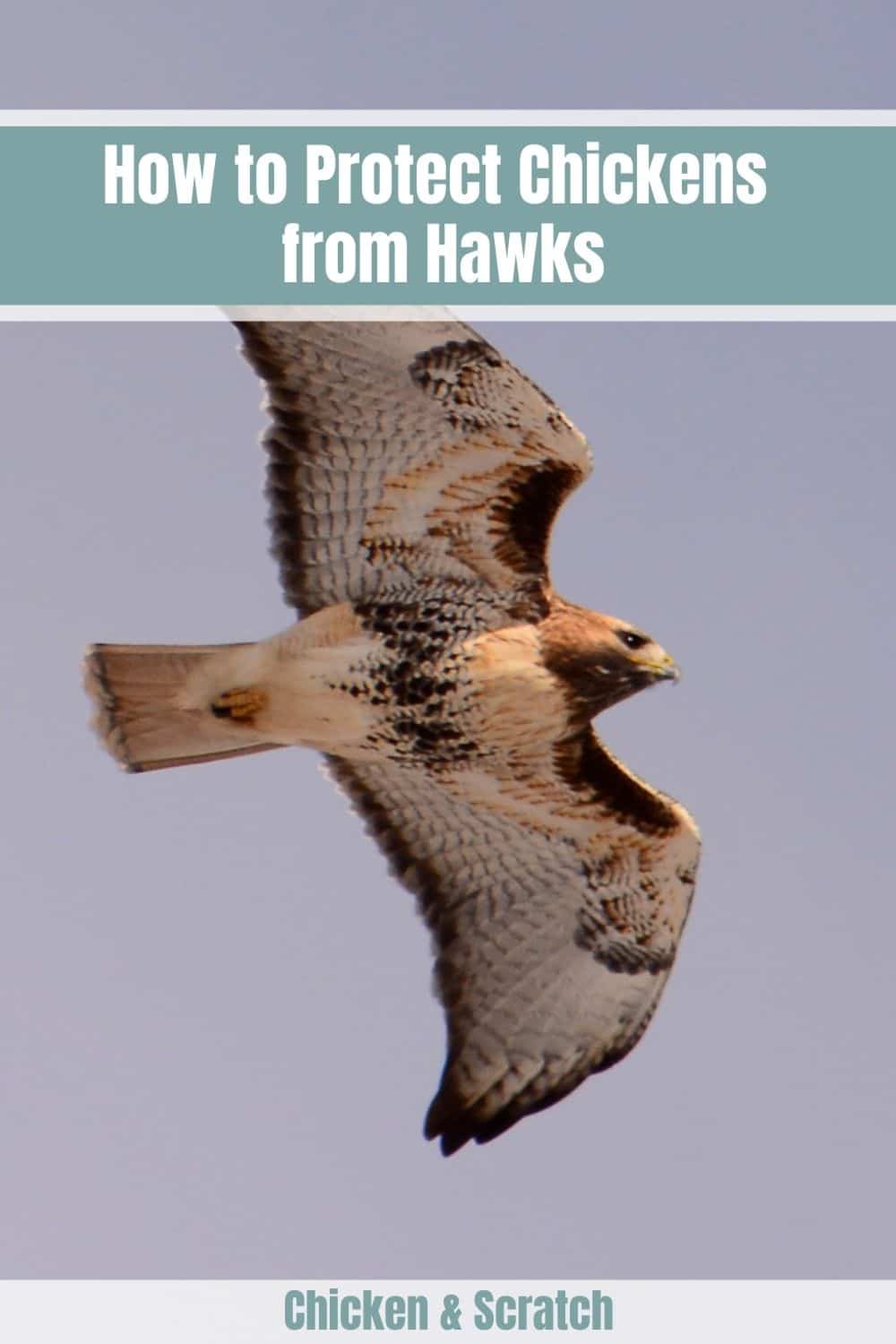
Chicken hawks are predatory birds renowned for hunting down chickens and other poultry. Seeing a hawk swooping down and snatching your precious chickens is appalling. It’s no less disheartening when you find your chicken’s feathers littered on the farm in the wake of a hawk’s predatory activity.
So, how do you stop these hawks from wreaking havoc on your poultry? Before we answer that, let’s take a closer look at the Chicken Hawk and their predatory tactics.
The Hawk
North America has over 23 species of hawks, and you’d be lucky not to have one as a neighbor. The red-tailed hawk is particularly notorious for preying on chickens, earning it the nickname ‘chicken hawk.’
The hawk and other raptors are legally protected, so you can’t shoot one down. As such, you’ll need to look for different ways to protect your chickens from hawks.
The Hawk’s Predatory Tactics
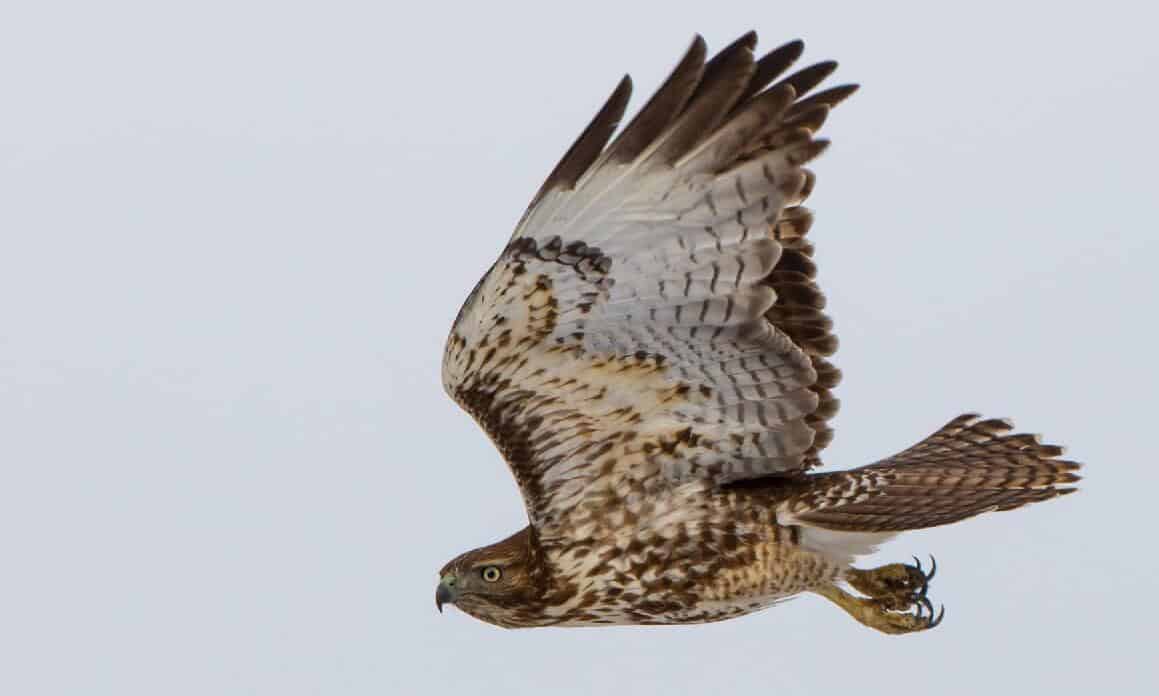
If you’re ever going to get hawks off your chickens, it’s essential to understand their predatory behavior. Knowing their attack tactics will enable you to develop an efficient defense mechanism.
First, hawks don’t care where they go hunting as long as they’d find food there. Hawks were designed by nature for hunting in dense woods, around ponds, on the roadside, and just about anywhere. So, building a long, narrow enclosed area or “run” for your chickens doesn’t guarantee that hawks won’t be able to prey on them.
Furthermore, hawks prefer to hunt easy targets in open fields. So leaving your chickens to forage in the open without any form of protection makes them vulnerable to a hawk attack.
Additionally, hawks are prey for other predators, like eagles and owls. This relationship explains why hawks don’t eat their prey in the open but would instead drag them to a secret place.
Finally, hawks are intelligent birds and can quickly learn the patterns of your activities. That’s why changing your routine could prove helpful in outsmarting them.
How to Protect Your Chickens from Predatory Hawks
When we moved to our new property years ago, we decided to start a poultry farm. But it quickly seemed like a terrible idea because we suffered hawk attacks every other week until all our chickens were gone.
In my desperation, I went investigating, asking our new neighbors, who also happened to own poultry farms, how the hawks seemed not to see their chickens.
From research and years of running our hawk-attack-free poultry, we’ve put together methods that worked for us and that you can use to protect your chickens. Protecting chickens from hawks mainly involves using time-tested tactics to secure your runs and deter hawks from preying on your birds.
Depending on how large your poultry is and how much you’re willing to spend, you can try a combination of the following:
1. Secure the Coop
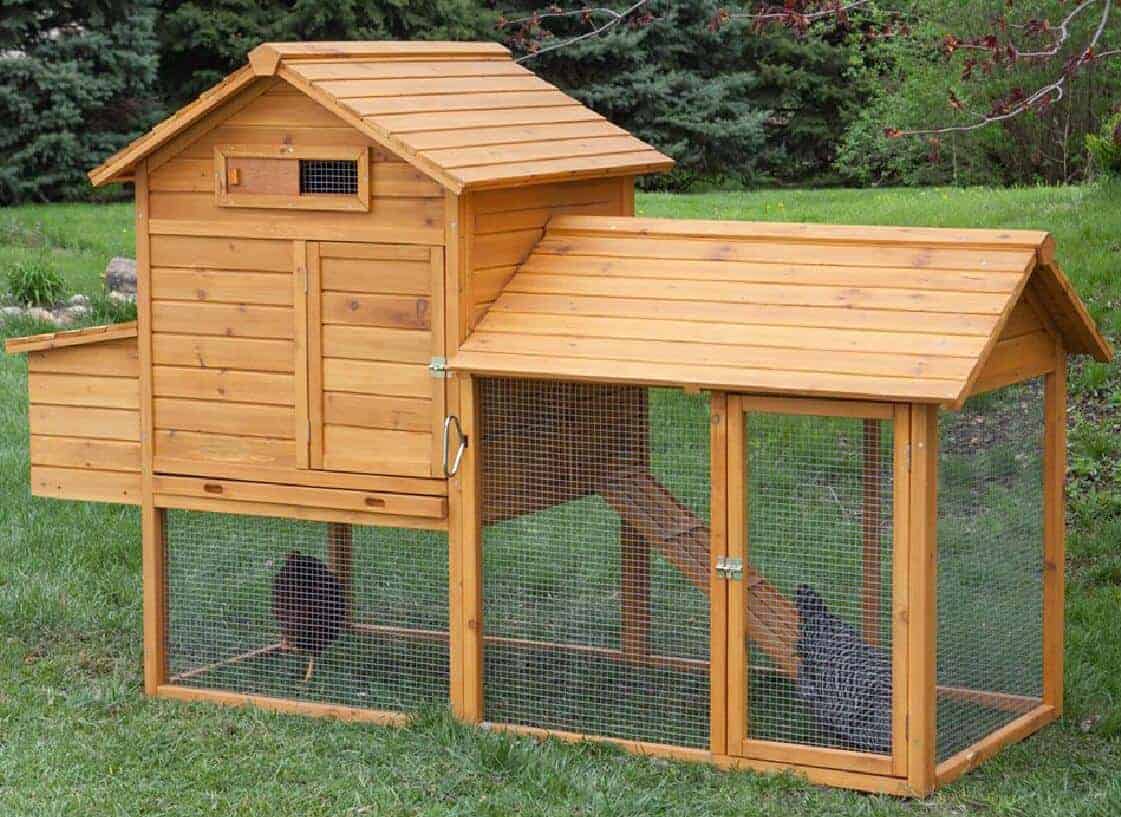
Whether you build the chicken coop from scratch or buy one, securing it is the first step to protecting your chickens from hawks. If your coop is too narrow, your chickens can’t escape the edge, making them easy prey for the hawks.
With a broader coop, however, your chickens will have a bigger space to move about and a better chance of escaping the hawks.
Remember to incorporate a hardware mesh to keep the hawks out when building your coop. Bury the hardware mesh 6 inches deep in the ground to create some security for your chickens.
2. Install a Roof
Another vital step is covering the coop. Most people would want to have a solid roof on the chicken coop. You can use chicken wires to cover the run to prevent the hawk from attacking your chickens. Another alternative is the tarp sheet, which provides shade and protection.
Before deciding on the type of roof to install, consider answering the following questions: “Do I want a temporary or permanent solution?” “How much am I willing to spend?” “Do I want to provide protection and shade, or just protection?”
The chicken wire makes a secure permanent roof for your coop. Any hawk attempting to dive through it will get entangled, giving your chickens enough time to run safely.
To completely deter the hawk, use a brightly-colored wire, preferably orange, which the hawk sees perfectly well.
3. Secure the Feeding Area
Most birds of prey, including the hawk, target the feeding area not because of the food but for the chickens. The birds are most vulnerable when feeding, as they’re relaxed and not so alert. Thus, protecting their feeding area from predators is essential by putting a piece of chicken wire over it.
4. Add a Black Chicken to the Flock
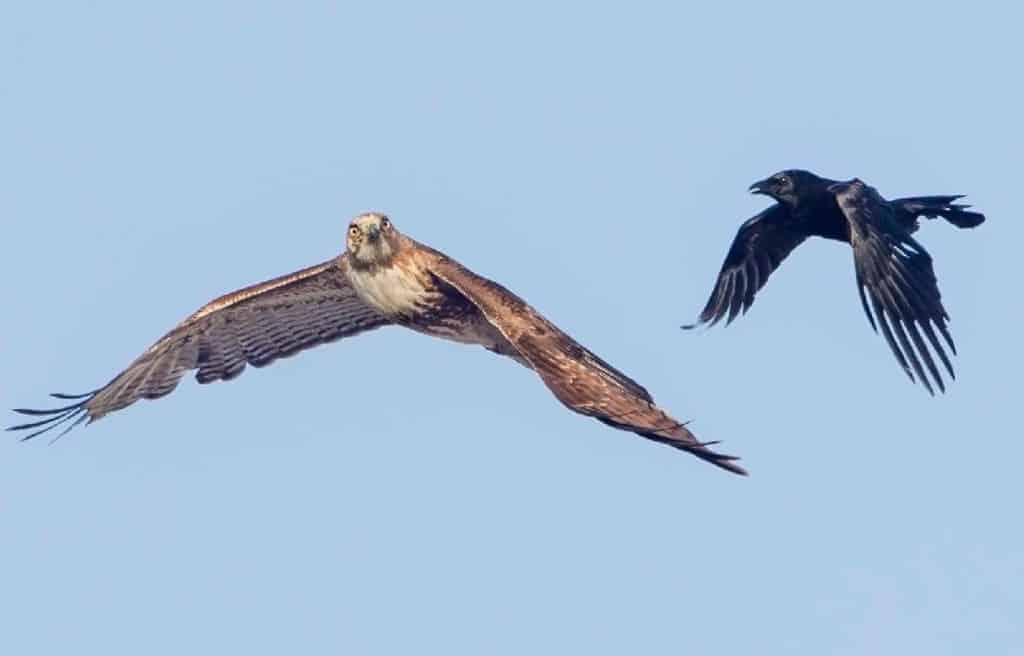
Incorporating a black chicken into the flock will keep hawks away. When we first learned of this, we laughed it off – a black chicken was just like every other chicken. So we felt they’d be hunted just like every other bird.
But, after we learned that the crow is a natural enemy of the hawk, we understood why we needed a black chicken. With a black chicken in the run, the hawk will mistake it for a crow and keep its distance. No hawk enjoys a hot pursuit by a flock of crows.
5. Get a Rooster
Getting a rooster was one of the first things we did to protect our chickens. While we expect our chickens to run when they see a hawk, we know they don’t fully possess the typical rooster behavior.
A rooster is a natural protector who’ll do everything possible to keep the chickens out of harm’s way.
When the rooster sees a hawk, he sounds an alarm and gathers the chickens in a safe place. He moves before them, securing them till the bird is gone. Of course, not all roosters can do this. If, however, you find one that can do that, never let him go.
6. Increase the Visibility in the Area

Hawks usually perch on nearby trees, waiting patiently for an opportunity to swoop down on your chickens and immobilize them. As a result, detecting the bird becomes more difficult when you’ve got tall bushes and grass around your poultry.
Consider cutting the overgrown grass and bushes in your surroundings. This practice will reduce the cover the hawk has, thus mitigating their likelihood of attacking without being seen. The hawk is a smart bird that wouldn’t risk attacking when exposed.
However, planting bushes and shrubs in and around your backyard can help protect your chickens. When the chickens sight a hawk nearby, they can quickly take cover in the thickets, reducing their exposure.
So. while increasing visibility in the area, only clear out overgrown bushes that can protect a prowling hawk.
7. Use a Watchdog
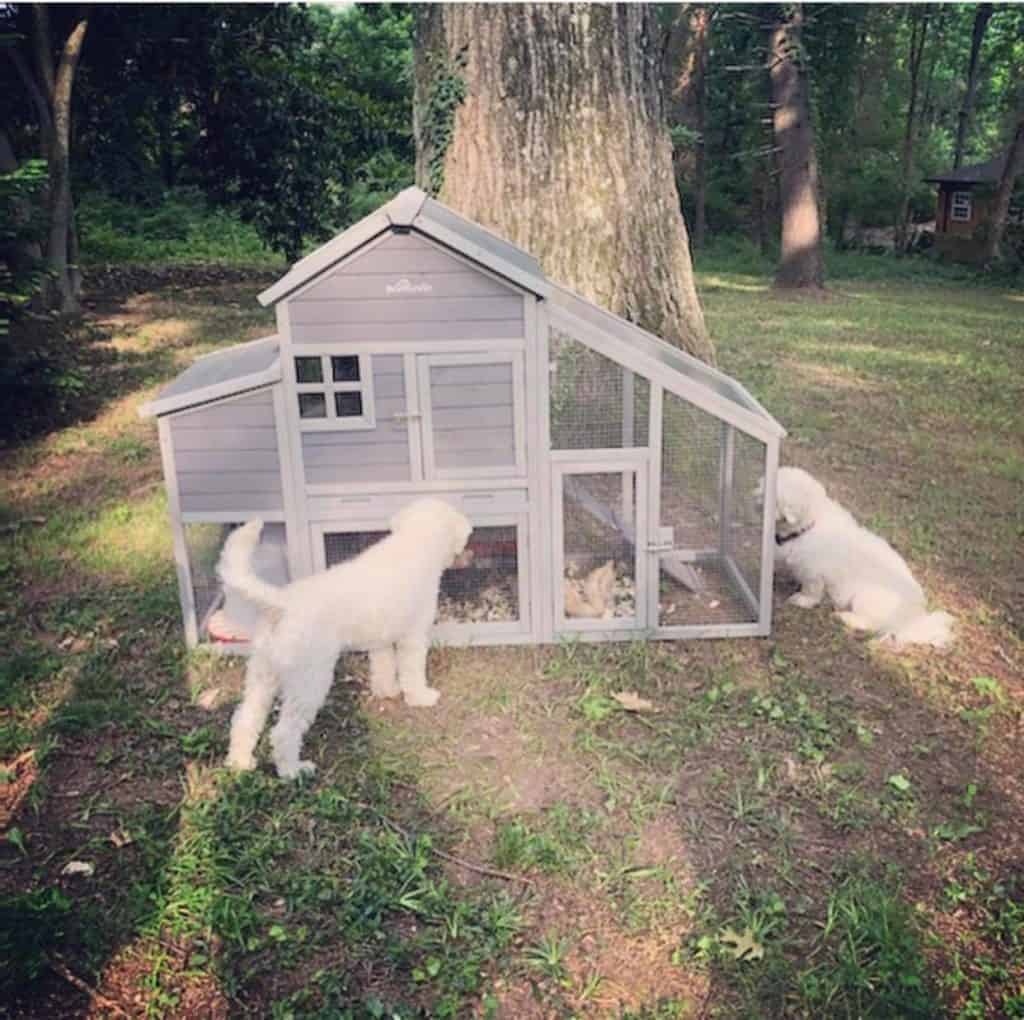
Having a watchdog with your chickens when they roam outdoors is a great way to protect them. Predatory hawks will think twice about swooping down when the dog is nearby. Also, the hawk often finds the smell of a dog unpleasant, which serves as a deterrent.
Consider letting the dog out at different times of the day so the hawk doesn’t precisely pinpoint the dog’s schedule. Sometimes, I take a walk with my watchdog to remind the hawks that they’re prey too.
8. Get Scarecrows
The old trick of using scarecrows as a decoy to scare predatory birds away from the farm works perfectly in poultry. You can easily make scarecrows by hanging human clothes on nailed wood and placing them in the backyard or poultry farm.
To ensure the hawk doesn’t figure out your ruse, change the position of the scarecrow now and then.
You can also get an owl-shaped object to mount on the farm, and the hawk won’t dare come close to your chickens. Although this measure works well for me, there’s no guarantee it’d work for you, because some people have reported its ineffectiveness. However, consider giving it a try.
9. Hang Shiny Objects on the Farm
Hawks detest bright, blazing lights, and you can use this to your advantage. Hang your old CDs and other reflective objects around the farm. These objects will give off blinding reflections from the sun that’ll keep the hawks away.
Avoid putting up mirrors in the yard as they’re potentially harmful to chickens.
How to Maintain Hawks off Your Coop?
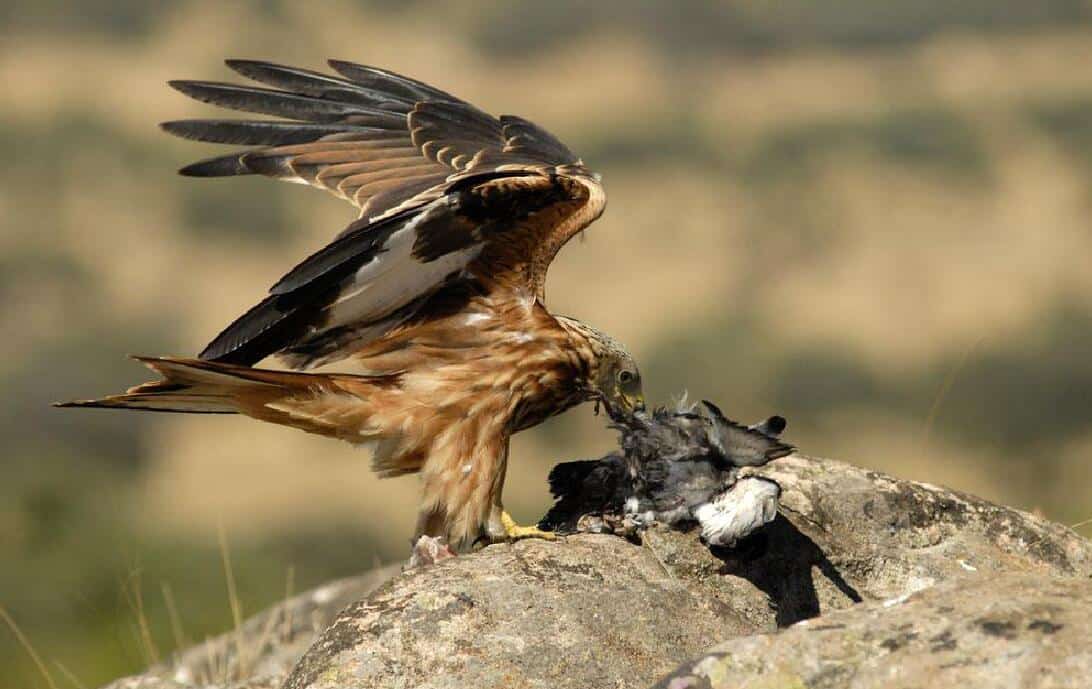
Now that we know how you can keep these pesky predators from your flock let’s talk about the tips you can do to keep them away from your chickens.
Monitor the Coop
To ensure that hawk activity is as low as possible on your farm, ensure that you monitor it regularly. As humans also pose a threat to them, these birds tend not to go near the coop if they sense humans nearby. So, by being near the coop and maintaining the area, you can both clean and protect your flock.
Do Multiple Deterrent Methods at the Same Time
Many of these methods are good in themselves; however, do you know what can make them better? Doing multiple at the same time!
Mix and match multiple methods of keeping hawks away from your coop. This way, you can add layer-upon-layer security to the perimeters. It can strengthen the guard against these pesky prey.
Monitor Hawk Activity Regularly
Much like any animal, hawks have their own behavior and patterns. So, studying and monitoring
the hawk activity in your area would be best. You can rely on the time of the day, weather, and season if a hawk attack is more likely to happen.
This method can help keep the hawks from chickens by examining which areas of your property are frequented by the hawks. This can be on lush or high grounds, near poultry nests, or perching trees.
This knowledge might give you a clue of any patterns in their behavior towards your flock. You could use this data to consciously position your flock farther away from potential danger and specify the right method for you.
Summary
You can’t stop hawks from being predators, but you can prevent them from growing fat on your chickens. In the last couple of years, I’ve had to worry less about a hawk snatching my chicken. Instead, I’ve focused on rearing my chickens, improving their egg yield, and expanding the farm.
Here’s a review of the ways you can protect your chickens from hawks:
- Build a secure coop, with a roof
- Secure the feeding area
- Add a rooster to the chicken flock
- Get a watchdog
- Increase the visibility of the area
- Use decoys like black chickens, scarecrows, and shiny items
So, why don’t you go ahead and implement these techniques in protecting your chickens from hawks? With these measures, you’ll never have to worry about your chicken’s safety.
Do you have any questions, comments, or contributions? Feel free to drop them in the comment section, and I’ll be more than happy to reply.

Joseph Hudson has been raising chickens for over 15 years. In 2018, he completed the Agriculture & Natural Resources program at Mt. San Antonio College. He currently raises over 1400 chickens on his 7.5-hectare farm. He keeps sharing his experience on raising healthy and happy chickens on Chicken Scratch The Foundry.







I had a hawk fly into my boxwoods and attack my large black hen. I was surprised to say the least. I’ve now got a fake owl with a turning head on a pole as a deterrent. I also had a scarecrow and foil tins hanging from my trees when it attacked. Now the hens are cooped up for a while in hopes that & the owl will deter it. It also clawed my large, 20 lb, black cat.
I have a black rooster and have lost 2 chickens to a predatory hawk. Of course the black rooster is on 4 months old. Think that could be the problem>
we have hawks and screech owls, havent lost a chicken yet. The hawk has been setting on the fence just above the chickens so my wife is getting nervous . Going to buy orange plastic snow fence at my favorite building supply , Menards for a roof for the run. It is an old dog kennel.
Having a black chicken will not deter the hawks. My black chicken was killed by a hawk just last week.
mine too 🙁
The reason I was reading this article is I had a hawk kill 2 of my chickens. ..all of my chickens are black. So saying a hawk won’t go after black chickens because they think it’s a crow or flock of crows is just speculation and shouldn’t be on this list.
I have several black chickens, well I had several and I have12 left out of 28. I have scarecrows, 4 dogs, 2 huge outside cats and fake owls and snakes. I also have 4 roosters. I am desperately trying to save my chickens but the only way to male sure it stops is with a bullet!
100% agree. It is ridiculous that these birds are protected while so many pet chickens are killed every day. Makes me sick. I have a huge black rooster and a black hen and that did not protect my most precious little beloved chicken.
I agree!!!
There is an old ranchers saying; If you’re gonna have livestock you’re gonna have deadstock. Killing predators is simply an act of revenge. It doesn’t prevent future attacks since there are always more predators around. For those of us raising livestock it is our job to do our due diligence and use as many non lethal tools and pro active husbandry methods as needed in order to minimize losses. If you can’t raise livestock without killing native predators you shouldn’t raise livestock.
B.s.
It’s up to man to take dominion over the animals. Animals, especially dangerous animals should fear man to the point they avoid humans and keep their distances. We can coexist with animals that do that. That means weeding out or putting fear of humans in problem animals which are normally the bolder of the species that you do not want to reproduce and pass the trait on and further the problem. Let the timid animals of those species keep their distances and reproduce and that will limit human – animal conflicts. Human life is #1 and domestic animals are not 2nd rate to predators or any other animal that poses a threat to our well being. To many laws have gotten extreme to the point they are against the victims, animal and human justice both. The laws protect the animals that harm humans and humans that harm humans. The speed limit is typically broken and not seen as a crime. I see it more reasonable to protect my pets and farm animals that are a part into sustaining human life.
Thumbs up!
That’s stupid reasoning. 500 hawks will reek more havoc than 5 hawks, supposing you can kill 450.
I 100% agree with you Keli! While I do love chickens, they are neither a native nor an endangered species.
Doubt hawks are even endangered anymore, and if they are well tough crap they should evolve some brains and move on and associate humans with death, I’m fine with a hawk killing snakes or rats but when it attacks My chickens it just because a pest and must be removed as so. Much like how they have hunters remove elephants and lions in Africa that have started targeting livestock and crops, its called balance and it must be restored. Jeez I knew a guy who killed a buzzard and made sausage out of it made him puke but still why? Cuz there’s too damn many that’s why. People literally hit them with cars and they are a protected species but that’s ok but God forbid we protect our livestock, our livelihoods because of some stupid law that was put in place to prevent people from killing those birds back in early 1900’s and late 1800’s for fancy hats. That’s why they are protected cuz of that they got tired of people killing them to make hats from thier feathers and why they made it illegal to kill song birds and the such cuz people did it with thier feathers too. It wasn’t about the people protecting what’s thiers it was about preventing poachers from killing them out for fancy rich people hats that sold in the thousands. I mean damn dude it’s technically illegal to kill a deer or something like that out of season, but if it’s attacking your animals or crops or harming your livelihood you can legally kill it.
Most intelligent and realistic comment regarding this topic I have ever seen. When we started losing chickens to raccoons we built a large predator proof chicken run and the raccoons moved on. Can’t blame them for taking advantage of an easy food source.
Well mine wasn’t an easy food source yet still scalped one through the chicken wire and killed a duck so easy food source My butt but that’s fine he got his. Also it’s a large coop with new chicken wire and he grabbed it through the wire so easy food source unlikely just saw opportunity. Thought it was mink at first but after catching him in trap next morning with his duck he killed I was disappointed as I was hoping to tan some mink fur but nonetheless his existence became that of a kitchen wall ornament so he can watch for all of eternity at what he can never have.
I beg to differ kill enough of em and they finally get the message I have used traps to catch the predators with thier own meals they left behind and kill them afterwards and have just plain shot several, reinforce your coop, then start killing off the pests. If you have too many pests it never ends, and yes even snake repellent eventually doesn’t work for pesky snakes. Only killing them solves the issue, as they will keep coming back and showing others what you have and will keep testing it and waiting till they can get what they want. Killing them prevents them from showing others of thier kind and prevents thier reoccurance as they will eventually stay away because the area will be dangerous. Had a snake issue killed the snake, had a raccon issue killed him in trap with own meal, haven’t had anymore issues with those species now a hawk or owl I think has found a way to fly under the roof that’s has a opening and fly upwards at an angle to get into coop Now and he will now be dealt with just as the rest have. I have owned chickens my whole life after awhile you put enough human pressure from killing them down around that area now even a deer will think about taking a dump in your back yard. Sorry to say it but killing them is the best and easiest method to prevent reoccurance. My longest amount of time without predators trying crap was 10 years cuz I spent 3 years culling every predator around so trust me it works. Just remove the ones that know about your chickens and keep showing up after you fix the the places they keep getting in and you won’t have anymore problems. Fun fact the raccon will now have a worse fate than being dead he is being mounted on a log and will be put in my kitchen for eternity to watch helplessly at all the food he will never be able to enjoy due to his actions, should he had stuck to the table scraps he would still be Alive but oh no somebody had to get smart and scalp a chicken, and kill a duck through my wire mesh.
Hawks just moved in next door to me. They attacked one chicken who was able to get away. I have 2 owls, useless, reflective tree ornaments, useless. A dog, useless and the have even tried to rip thru the mesh cloth on my run. They sit outside the run nearly every day just watching. I’m chasing them away all the time. Yesterday, one flew right between my wife, me and our dog trying to get one. JUST missed her. We were not 10 feet away. They don’t care about any of it. We have to leave them in the run. no free ranging until they migrate again.
Would never free range without mesh dome because of that reason also second just shoot it and toss it or bury it or hell feed it to the dog, doubt the dog would care he would probably enjoy hawk flavored bird meat.
That’s the only solution I’ve found to work. I had hawk get in and killed 9 of my black bantams in one day. Let’s say when I got home from work the hawk was still in run doing his work. He got a little lead poisoning. My run was covered with netting and he somehow cut it.
I agree about the bird coloration. Perhaps her hawk had an issue with black in the past but I have lost 2 of my largest hens, both pitch black, that were so heavy the hawk couldn’t even lift them off the ground yet killed them anyway. My point is hawks need to eat and, if they aren’t finding easily caught smaller foods, anything is fair game. The hawks are doing what nature wants them to do, even when they sometimes take what we are attached to. The only things I have found that are guaranteed to work (if anything can be totally guaranteed) is to provide good roofed coops with wide runs, wrapped in 1/8 to 1/4” hardware cloth that is secured under the ground, stagger routines constantly because hawks are super-smart and they learn exactly when and where prey is going to be every day, and put out those hanging, flapping shiny tapes from branch to branch. The tape strings also need to be moved around frequently so the hawk doesn’t get used to them and stop “seeing” them as a threat. I have several waterproof radios set in different locations around the coops and I turn on a different one each day with different types of talk or music, particularly insane talk radio where everyone is screaming all the time. Roosters are a God-send and most do a decent job of protecting all of their hens. Just be aware that the more aggressively protective they are, the more you have to work to prevent being seen as a threat and being attacked… if you are willing to understand their natural behaviors and work with them, you will not have to worry much at all. This means keeping distance between yourself and the hens while he is around. Why would you be considered any less threatening than other animals when you are approaching his girls? Just don’t get one and think he is going to be a cuddly baby- he has his mission in life and he does it well. Many roosters are given away or killed because of people’s expectations that they will be enamored with humans and never bother them- if the rooster is seeing you as a threat, he’s doing a good job. If you can’t work around those behaviors, don’t get a rooster. Never let them out as the sun rises or at dusk… these are prime times for the hawks to show up. One thing that I heavily bought into when I first started with chickens was how they were my pets and I had to let them run around outside for hours each day for them to be happy. This is not so-while they enjoy being outside when the weather is decent, they usually will return to their coops within an hour or so of going out, after they get their quota of bugs. Free-ranging is dangerous for the chickens and you must be prepared to lose more than you can tolerate if you leave them out. My final step I take is to stay outside with them whenever they are out. Both of the hawk attacks that were successful involved my having gone inside for a few minutes and leaving them. If you are out there the hawks will not attack- you are way too big of a threat to them. I usually have something with me, like a bright rag or something shiny and flappy (those tapes again) to pull out and wave around if the hawk is moving in too close for comfort. I know most people don’t want to put quite so much effort into it but, if you want 100% success, it’s all I’ve found to be fool-proof. So, my hens live in airy roofed coops with wide hardware clothed enclosed runs, the rooster protects his ladies and never bothers me unless I start moving in like I’m going to pick one up, they go out in individual smaller groups for a hour each in decent weather, the radios play, the tapes flap, and I am there with my trusty rags and sheer presence. If you really observe what goes on, you might be entranced with the hawks effortless gliding, their intelligence and speed, and remember that your hens are really the least of their preferences, as mice and small creatures are so much easier prey. If you have lost hens it is crushing, because the damage is grotesque to us and no one wants to lose one of their animals, but you do the best you can and hopefully no further attacks will be successful. I also benefit from being outside more often, getting to know the hens’ unique personalities and quirks, and observing our larger birds in the sky. Mostly, I have loved watching my rooster strut and fluff so he looks dangerous, see him be selfless in always calling the hens to anything good he finds and letting them eat first, cooing to them, and become a grand protector as needed. He has probably been my favorite bird and he knows it! I had too many birds I hatched at the beginning, which left them more at risk for many things. Try to keep your numbers small at any one time, keep their stress level down by providing good protection, and you will be rewarded with really fresh and healthy eggs every time! Good luck to everyone!
Have you ever thought about writing a book? You got a good start on it here, lol, And i had two really Good/nice roosters and both of them gave their lives yesterday protecting their hens!
I too had a black Bard Rock eaten and had another solid black hen in the mix when it happened. People don’t keep attacks from happening either. My neighbor’s rooster was picked up right in front of her. The hawk dropped it but not before decapitating it. Another friend had her chick scooped up right in front of her as she was getting them in for the night. I’m afraid my hens will never be able to free range again although they did so the past 6 months with no problem. The big yellow eye thingy isn’t doing anything either. The hawk is perched in the tree right above it with no problems. The bushes of protection wasn’t much protection as the hawk flew right out of the thicket when I went looking for my missing hen. So sad!!
Struggling with massive chicken loss. The attacks happen in the morning, lunch time, and early afternoon.
I’ve got 2 coops……….a permanent one that is surrounded by large trees and good high fencing (along with a section of covered wire). The chickens in this area are well protected and I’ve only suffered 2 attacks in the last 2 years.
The other coop was set up last spring, so it’s relatively new for the area. But, it is a mobile coop and is near our pasture in a 1500 square foot run………not a tree in sight (they’re tilling up and fertilizing a future garden expansion). I’ve got it surrounded by a 4′ fence and then a few elevated pallets for protection inside the perimeter, but nothing overhead. The hawks have found them recently, and I’ve lost 14 birds in 2 months………and 6 of them in the last week…..basically, it’s a bird day now. I’ve installed, recently, a grid work of string around some 8ft t-posts that crosses over the top of the enclosed run and then tied some shiny ribbon every couple of feet. My thought was that it would give the hawk less confidence in a full blown aerial attack. So far this hasn’t worked……I think they’re flying through the 4-ft exposed sides. I’m sure they just laugh at me! And, I’ve got an owl decoy I’ve been moving around and it has zero effect, obviously. I plan on tying some white flagging tape to create a visual barrier on the sides (which isn’t covered)……….. If this doesn’t work, then I’m throwing my hands in the air.
However, I am intrigued about the scarecrow and the previous mention of a radio blaring in the background (although this takes some of the peacefulness away from our place).
I am in complete awe of the hawk. They are beautiful, majestic, and an amazing hunter to watch……….if I could be a bird, I’d want to be a hawk. However, I’m down to my last straw of trying everything that is humane. I’m quite confident in my ability with a 12 gauge and some heavy load (and it’s the last thing I want to do). And I’m sure trying to lay in wait for a hawk is probably more difficult than deer hunting……their vision is so sharp, they would probably be watching me a mile away attempting to hide and never show up……….what a frickin’ dilemma.
Throwing your hands in the air ain’t gonna help! Dem dang hawks will dodge them every timee! Lol, The 12 ga is the only thing that will work!! W/the exception of maybe a smaller ga. BTW wonder what hawk tastes like? Probably chicken,,,
So probably the most important things are to secure the coop, by aerial and ground ways, keep a lot of the ground clear, and have bushes or cover, so that the hawks can be seen, and the chickens have cover.
We are new to this chicken thing, we have 6 young hens. We have a secure coop and 60 sf of an enclosed in run. So when they are inside I’m not worried at all. But we fully intend to let them roam around the backyard at some point. We definitely have a lot of hawks in the area and know its a risk but not immediate. Today, that changed. My wife looked out the window this morning and there was a hawk sitting on top of the run. She chased it away. All six chickens were inside the coop in one of the nesting bins, scared shitless. They wouldn’t come out for hours. Needless to say their fear of a hawk is innate. So now I’m searching the good ole internet to give me some ideas. Sounds like nothing is a 100% protection guarantee, other than not letting them out of the run. Thanks for this article and all the great comments!
Either put up a cover for your chickens, wire or mesh, or let em out of the coop, it makes no difference about a radio guys
Mike ignore my first comment it was meant for someone else. If I was in your position, I would probably think twice about letting my chickens ever roam free. They will die! If someone says they’ve been able to let theirs roam without incident, they just haven’t let them out long enough. Make your chickens a covered pen around there coop and you must cover the top! It doesn’t have to be expensive I built mine with used chain link fence on sides and covered the top with that heavy camo netting used for hunting cover. Regardless what materials you use, it must be heavy enough to stop the hawk. Im not sure how long the camo net will last, it is an experiment and has done great so far but the jury’s still out. Hawks have been found in places such as Central America, the West Indies, and Jamaica. A large hawks territory can span 18.5 miles! My chickens have a pen 20 x 30 and no need to free range. Chickens are very rewarding to raise not counting the eggs you collect. Great for kids too. Teaches them responsibility. If you ever have any leftover spaghetti noodles, they think that they are worms, and I get a kick out of watching them try and steal each others spaghetti (worms)!
Gov’t continues to work against us being self sufficient for Maslow’s hierarchy of needs i.e. food, water, shelter. The way the world is now and the direction it is taking, having chickens is not only a necessity, but we must do whatever we can to protect them. Our gov’t’s and the UN are warning us of the coming food shortages (that they have had a hand in influencing). Your chickens eggs and in some cases meat will be very important for your families survival. Protect them any way you can.
Note: while I understand the tax benefits to being listed as a ‘farm’, doing so puts you on the list of places that will receive a visit when they want to 1. cull birds due to another fabricated bird flu breakout, 2. do what they’ve done in the past and ceased all food from farms under the premise that it will be “fairly redistributed to the population” which was false.
Out of sight can be out of mind. Try to hide your animals and crops from view. Ideally, get far away from any major centers.
What is your evidence supporting your claim that bird flu outbreaks are fabricated?
Hi Elizabeth – from what I hear from friends who are turkey or chicken farmers, when their birds are subjected to a PCR test that comes up positive (I think there is a problem with false positives) the government makes “an offer you can’t refuse.” They offer to pay more than market value per bird for total slaughter, or if your birds really do have bird flu and die, you get nothing. So what is your basis for doubting what he said? How many chicken/turkey farm owners have you spoken with? I’m guessing not many or none. It’s good to ask for evidence. I wish you had been asking for evidence when everyone was saying the vaccination stops the spread. You missed your calling.
So it’s been well gone over that the black chickens thing is a myth. But also birds have a terrible sense of smell; therefore I am highly doubtful that hawks do not care for the smell of dogs.
I had a problem with hawk.i ran single wires across the chicken yard. 5 ft apart. Some barbed and some non barbed. He no longer can swipe. I have very mean rooster now in there so if he lands inside he must deal with mean rooster.
No more stealing chickens.
He was stealing chicks not now!
It’s awesome that you’ve found a way to outsmart those pesky hawks! Your chicken yard wire setup, mixed with barbed and non-barbed wires, must’ve really thrown them for a loop. Hawks are definitely thinking twice before trying to snag one of your chicks now.